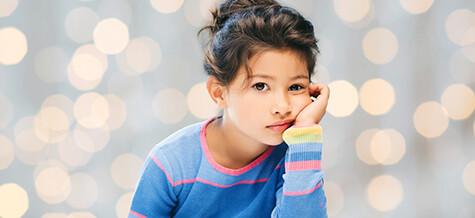
Holidays are great fun, but let’s face it, don’t we all experience some level of sensory overload and/or anxiety during this time? There’s an overabundance of activities, sugary and not-so-healthy foods, parties, decorations, travel and extra time with family and friends. Tough for adults to manage but how can we help our little ones through to avoid hyperactivity and/or meltdowns?
Over a period of a few weeks, their still-developing brains are suddenly exposed to extra crowds, noise, tree lights, and more sugar. What if that brain isn’t yet able to process all of that new information? Or let’s say you have a child with special needs, who is particularly sensitive to the different stimuli?
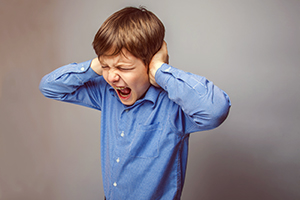
A child in sensory overload may start screaming and covering their ears to noise.
What are Some of These Signs of Sensory Overload?
Behavior can change such as jumping off furniture and excessive running in the house.
- A child starts reacting to noises, covering their ears, screaming, crying to drown out the overloading stimuli
- Pushing, pulling, shoving, becoming argumentative , throwing things and even biting
- Without warning throwing themselves on the ground, crying uncontrollably
- Refusing to attend or participate in activities
Tips for Reducing Anxiety and Sensory Overload
These tips can help both adults and children!
- Say NO more often and create healthy boundaries for you and your family
-
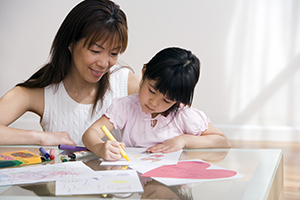
Keeping to routines and creating special quiet time activities helps everyone slow down during holidays.
When at others’ homes and traveling bring healthy food you know your child will eat. Don’t forget the water bottle!
- Create a visual calendar so that there are no “surprises” for your little ones
- Keep to routines as much as possible
- New clothes only for one holiday activity-otherwise too stiff, itchy, uncomfortable
- Manage times for arrivals and departures and stick to them
- Build in lots of rest before outings, allowing for “chill” time too upon returning home
- Schedule “art” or coloring quiet time, which is very therapeutic!
- Avoid sugar and processed foods. Encourage and offer more healthy fruits and veggies
- Make sure they are getting lots of SLEEP! Celestial Seasoning’s Sleepytime Tea for Kids
and reading a good book together can truly prepare a child for a good night’s sleep. Also putting a diffuser with lavender oil in their bedroom helps with calming
- Get everyone outside-we all know how healing and calming it is to be with Mother Nature. Kids burn off excess energy, tension and get fresh air! “Nature therapies are being used very successfully to ease both emotional and physical stress” according to Linda Buzzell, co-editor of the book “Ecotherapy” and a psychotherapist at Pacifica Graduate Institute in Santa Barbara, California.
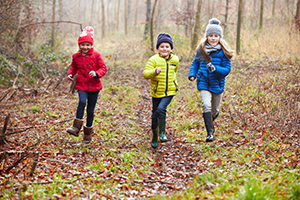
Getting outside is healing and calming and can’t be over-emphasized enough for managing anxiety.
The stats back her up. According to findings published in 2010 from the University of Essex, in England, five minutes of “green exercise” outside in nature was as effective in treating mild-to-moderate depression in people of all ages as taking anti-depression medication, with young people and the mentally ill benefiting most.
A Japanese study published in 2006 in the Journal of Physiological Anthropology determined that “forest therapy,” or walking through treed landscapes, has a calming effect on people—lowering levels of the stress hormone cortisol by 16 percent, as well as heart rate and blood pressure.
Supplements Can Help Too!
Vitamin B Complex deficiencies have been well studied and linked to problems with the nervous system including anxiety. While the research has not focused on children, it is generally safe to increase B vitamins in your child’s diet or the addition of a vitamin supplement to help decrease anxious symptoms. Click this link to buy from Amazon: MegaFood – Kid’s B Complex
Food sources of B complex include:
- Pork, berries, legumes, lean meats. Nuts, soy milk (Vitamin B1)
- Eggs, dark green vegetables, fish, grains, lean meat, mushrooms (B2)
- Sunflower seeds, tuna, poultry, potato, cottage cheese, liver (B3)
- Organ meats, avocados, broccoli, mushrooms (B5)
- Green beans, whole grains, spinach, fish, bananas (B6)
- Soy products, egg yolks, fish, organ meats, cheese, sweet potatoes (B7)
- Green leafy vegetables, citrus juice, legumes, tofu, tomato juice (B9)
- Milk, fish, fortified breakfast cereal, eggs, shellfish (B12)
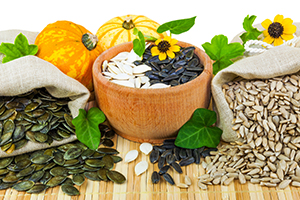
Adding pumpkin and sunflower seeds as snacks have been shown to reduce anxiety.
There are also several studies over the last 10 years that have linked Magnesium deficiencies with anxiety as well as the reduction of anxiety after taking Magnesium supplements. Increasing Magnesium in your child’s diet is relatively easy. Some seeds like pumpkin, sunflower, flax and sesame are high in Magnesium and can be added to children’s food or as a snack which really helps.
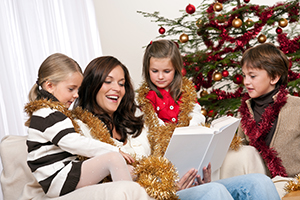
Proper planning and management of the holiday season pays off for everyone!
Most importantly, be the role model! If you create an environment and holiday traditions that reflect lower expectations and less running around, everyone will be happier and healthier.
Peace, Joy and Calm this Holiday Season!
![]()
If you “Like” this post, I’d be thrilled if you’d share it.
NOV
